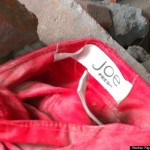
Corporate greed makes disasters like the recent Bangladesh factory collapse almost inevitable.
by Jim Hightower
You see the clothes in stores across our country and around the world: colorful and stylish clothing with happy-sounding brand names like Children’s Place, Papaya, Joe Fresh, and Mango. But you don’t see the factories where these cheerful garments are made. Nor are we shown the strained faces of the impoverished workers who make them, paid little more than a dollar a day for long, hard shifts.
We only catch a glimpse of the grim reality sewn into these happy brands when yet another factory is in the news for collapsing or burning down, bringing a grotesque death to hapless workers trapped inside.
It’s a horror that keeps happening. And after each disaster, the brand-name marketers and retail profiteers cluck with sympathy for the families of the dead and decry the “tragic accident.”
As Scott Nova of the Workers Rights Consortium put it after the most recent atrocity, when a Bangladesh factory collapsed and crushed hundreds of garment workers, “The response is always the same: vague promises and public relations dodges, while the pile of corpses grows even higher.”
The April collapse in Bangladesh that killed more than 700 garment workers wasn’t an “accident.” It was the inevitable result of a Western business model that demands such low prices from offshore suppliers that worker safety is their dead-last priority.
The April collapse in Bangladesh that killed more than 700 garment workers wasn’t an “accident.” It was the inevitable result of a Western business model that demands such low prices from offshore suppliers that worker safety is their dead-last priority.
In the corporate hierarchy, death is coldly built into the consumer price and routinely accepted in the boardrooms as a justifiable means of adding another dime to the bottom line. For information and action, go to WorkersRights.org.
© Copyright 2013 Jim Hightower, All rights Reserved. Written For: StraightGoods.ca
 Jim Hightower is a radio commentator, writer, and public speaker. He's also editor of the populist newsletter,
Jim Hightower is a radio commentator, writer, and public speaker. He's also editor of the populist newsletter,
Sorry, the comment form is closed at this time.